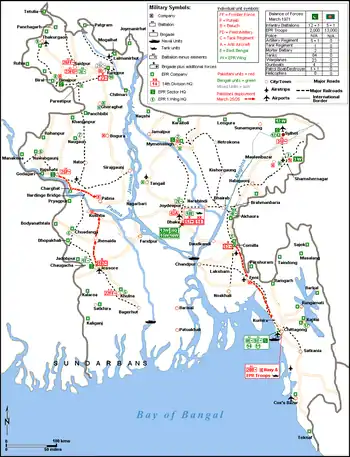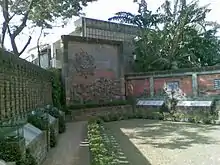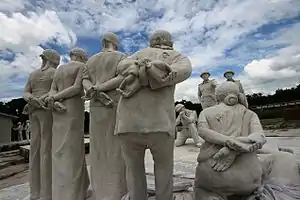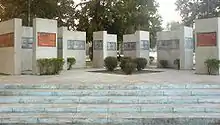| Genocide Remembrance Day গণহত্যা স্মরণ দিবস | |
|---|---|
 | |
| Observed by | Bangladesh Bangladeshi diaspora |
| Type | National |
| Significance | Commemoration of the Bangladesh genocide |
| Date | 25 March |
| Frequency | Annual |
| First time | 2017[1][2] |
Genocide Remembrance Day (Bengali: গণহত্যা স্মরণ দিবস, romanized: Gaṇahatyā Smaraṇ Dibas) is a national day of remembrance in Bangladesh observed on 25 March in commemoration of the victims of the Bangladesh genocide during the Bangladesh Liberation War in 1971.[2][3][4]
On 11 March 2017, the Jatiya Sangsad unanimously passed a resolution designating 25 March as a Genocide Remembrance Day.[5][6] The day honours and remembers those who suffered and died as a result of the actions of the Pakistan Army during Operation Searchlight, which initiated the Bangladesh Genocide culminating with the Independence of Bangladesh.[7][8][9][10]
History
The date 25 March commemorates Operation Searchlight, a planned military pacification carried out by the Pakistan Army, started on 25 March to curb the Bengali independence movement by taking control of the major cities on 26 March, and then eliminating all opposition, political or military, within one month.[11] Two days after the beginning of the operation, foreign journalists were systematically deported from East Pakistan.[12]>
During this period the persecution of the Bengali population by the Pakistan army was notable. It is believed this was on account of the contempt Punjabi Pakistanis had for Bengalis. There is evidence that among the Bengalis, the Hindu minority was doubly marked out for persecution. In a post-war enquiry several senior Pakistani officers admitted to systematic targeting of the Hindu community. General A. A. K. Niazi, commander of the Pakistani Eastern Command, denied ordering extermination of the Hindus.[13]
"Bangladesh will reach out to UN seeking recognition of the 1971 Genocide while the government declared March 25 as Genocide Day", according to Liberation War Affairs Minister AKM Mozammel Huq.[14]
International recognition
The government of Bangladesh is working on achieving global recognition of March 25 as "Bangladesh's Genocide Day". Genocide Watch and Lemkin Institute for Genocide Prevention issued statements on the Bangladesh Genocide of 1971 perpetrated against Bangladeshi people by Pakistani Army. These statements will strengthen and accelerate Bangladesh's commitment to achieve global recognition of "Genocide Day".[15] International Association of Genocide Scholars (IASG) on 25 March 2023 adopted a resolution recognizing the genocide committed by the Pakistani military during the Bangladesh Liberation War in 1971.[16]
Gallery
 Location of Bengali and Pakistani military units during Operation Searchlight
Location of Bengali and Pakistani military units during Operation Searchlight The Jallad Khana Memorial at one of the killing fields in Mirpur
The Jallad Khana Memorial at one of the killing fields in Mirpur.jpg.webp) Human remains and war material in Liberation War Museum
Human remains and war material in Liberation War Museum A sculpture in Meherpur showing the execution of Bengali intellectuals by the Pakistan Army
A sculpture in Meherpur showing the execution of Bengali intellectuals by the Pakistan Army Monument in honor of those killed at Dhaka University
Monument in honor of those killed at Dhaka University
Genocide & persecution in Bangladesh
- Bangladesh genocide (1971)
- Al Sham, perpetrator
- East Pakistan Central Peace Committee, perpetrator
- Razakars, perpetrator
See also
References
- ↑ "Whole nation should observe National Genocide Day". New Age. 14 March 2017. Retrieved 6 July 2017.
- 1 2 "Bangladesh declares March 25 as Genocide Day". NTV. 11 March 2017. Retrieved 6 July 2017.
- ↑ "PM slams Pakistan for propaganda about '71 genocide". The Daily Star. 20 February 2017. Retrieved 6 July 2017.
- ↑ "Declare March 25 as Genocide Day". Daily Sun. 17 February 2017. Retrieved 6 July 2017.
- ↑ "Parliament passes motion to mark March 25 as Genocide Day". The Daily Star. 11 March 2017. Retrieved 22 March 2017.
- ↑ "Parliament declares March 25 Genocide Day". Dhaka Tribune. 11 March 2017. Retrieved 22 March 2017.
- ↑ "Jatiya Sangsad declares March 25 as 'Gonohotya Dibosh'". Bangla Mirror. 11 March 2017. Archived from the original on 15 March 2017. Retrieved 22 March 2017.
- ↑ "Parliament declares March 25 as 'Gonohotya Dibosh'". The Finance Today. Archived from the original on 15 March 2017. Retrieved 22 March 2017.
- ↑ "14-party alliance to observe March 25 as 'Genocide Day'". Nirapad News. Archived from the original on 17 March 2017. Retrieved 22 March 2017.
- ↑ "JS resolution on Day of Genocide hailed". Bangladesh Sangbad Sangstha. Archived from the original on 15 March 2017. Retrieved 22 March 2017.
- ↑ Salik, Siddiq (1977). Witness To Surrender. University Press Limited. pp. 63, 228–9. ISBN 984-05-1373-7.
- ↑ Siddiqui, Asif (December 1997). "From Deterrence and Coercive Diplomacy to War: The 1971 Crisis in South Asia". Journal of International and Area Studies. 4 (1): 81. JSTOR 43106996.
- ↑ Bass, Gary J. (2013). The Blood Telegram: India's Secret War in East Pakistan. Alfred A. Knopf. pp. 81–83. ISBN 978-0-307-70020-9.
- ↑ "Bangladesh to seek UN recognition of 1971 genocide". Bangladesh Sangbad Sangstha. Archived from the original on 23 March 2017. Retrieved 24 March 2017.
- ↑ "Dhaka appreciates Genocide Watch's statement". Dhaka Tribune. 9 February 2022.
- ↑ "IASG recognises 1971 genocide". The Financial Express. 25 April 2023.